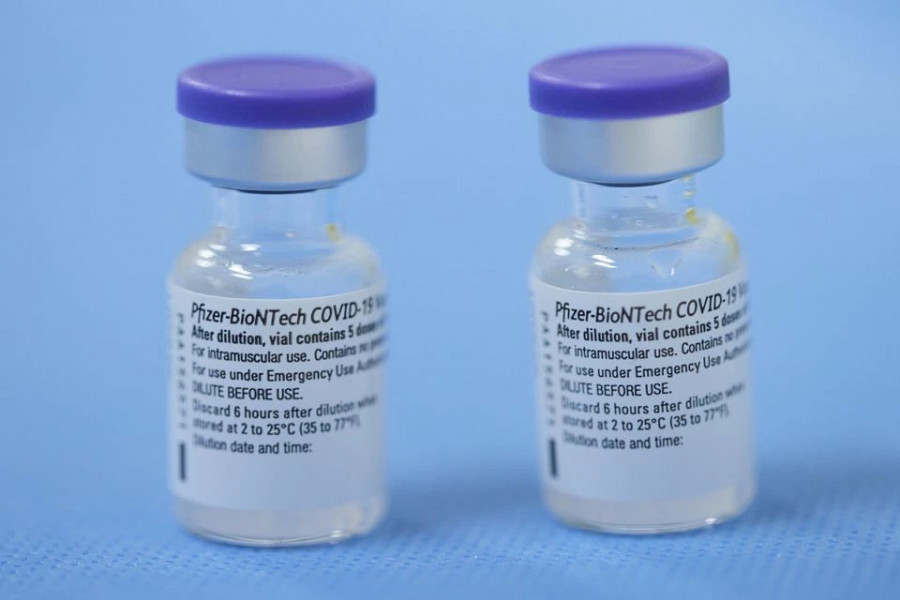Health
Cabinet okays proposal to buy 6 million doses of Pfizer vaccine
The vaccine is being procured through a non-disclosure agreement.
Arjun Poudel
The government has decided to purchase 6 million doses of the US-made Pfizer-BioNTech vaccine.
A Cabinet meeting presided over by Prime Minister Sher Bahadur Deuba on Monday approved a proposal of the Ministry of Health and Population to purchase 6 million doses of the vaccine under a non-disclosure agreement.
“The Cabinet meeting has also given permission to make the payment directly to the vaccine manufacturing company through the Nepal Rastra Bank,” Birodh Khatiwada, Minister for Health and Population, told the Post.
“We are purchasing 10 million doses of two vaccines from American firms—4 million doses of Moderna and 6 million doses of Pfizer.”
Earlier, the government had signed a deal to purchase 4 million doses of Moderna vaccine.
Both Moderna and Pfizer-BioNTech vaccines are expected to arrive soon, officials at the Health Ministry said.
The government has decided to administer Covid-19 vaccine to all eligible people by mid-April next year.
Earlier on October 24, the Health Ministry had sent a proposal to the Cabinet for permission to purchase Pfizer vaccine through a non-disclosure agreement, as Nepal’s law does not allow such an agreement.
However, the Cabinet returned the file twice to the Health Ministry.
Earlier, Nepal had purchased 10 million doses of Vero Cell vaccine with Chinese vaccine manufacturing company Sinopharm through a non-disclosure agreement.
Officials at the Health Ministry, meanwhile, said all necessary preparations have been completed for signing a procurement deal.
Nepal has decided to take a loan from the World Bank to purchase the American vaccine. An official at the Health Ministry said the government will duly follow the conditions set by the World Bank for taking loan to purchase Pfizer-BioNTech Covid-19 vaccine.
Pfizer-BioNTech is an mRNA-based Covid-19 vaccine. The vaccine developed jointly by the US-based Pfizer and the German firm BioNTech uses a copy of a molecule called messenger RNA (mRNA) to produce an immune response.
It is said that the Pfizer-BioNTech vaccine was 95 percent effective at preventing laboratory-confirmed infection with the coronavirus.
According to the US Centers for Disease Control and Prevention, the Pfizer-BioNTech vaccine was also highly effective at preventing laboratory-confirmed Covid-19 infection in 12-15-year-olds, and the immune response in these adolescents was at least as strong as the immune response in 16-25-year-olds in clinical trials.
“Evidence shows mRNA Covid-19 vaccines offer similar protection in real-world conditions as they have in clinical trial settings—reducing the risk of Covid-19, including severe illness by 90 percent or more, among people who are fully vaccinated,” the US Centers for Disease Control and Prevention said on its website.
The vaccine needs to be stored in minus 70 degrees Celsius, which is not supported by Nepal’s existing vaccine storage facilities.
The COVAX facility, a UN-backed international vaccine-sharing scheme, has already provided 100,620 doses of PfiZer-BioNTech vaccine to Nepal and authorities concerned are preparing to administer the jabs to people with compromised immunity from 24 hospitals throughout the country.
Nepal has also signed concessional loan agreements with multilateral funding agencies like the Asian Development Bank and the World Bank to support Nepal’s resilient recovery from the Covid-19 pandemic.
Nepal and the World Bank signed a $150 million (Rs17.78 billion) concessional loan agreement in June.
In August, the Asian Development Bank and the Nepal government signed a $165 million (nearly Rs20 billion) loan agreement to purchase safe and effective vaccines against Covid-19.
Nepal became the second country globally when it completed agreements with GAVI to procure 4 million doses of the Moderna vaccine in August, financed by the World Bank, through the COVAX’s cost-sharing option.
The Health Ministry had purchased 2 million doses of Covishield in February through an open deal paying $4 per dose of the vaccine.
Nepal so far has used AstraZeneca, Sinopharm and Johnson & Johnson vaccines to inoculate its population.
Nepal needs to vaccinate around 78 percent of its 30 million population—or around 25 million people, as per the government’s new plan that includes those aged between 12 and 18 years. Earlier, the government had planned to vaccinate only those aged 15 years and above.
Since around 4-5 million people are said to be living abroad, the government needs to vaccinate around 19-20 million people. For this, the country needs a little over 40 million doses of double-shot vaccines.
Nepal so far has used AstraZeneca vaccine manufactured in India, Japan and Europe; Vero Cell developed by Sinopharm of China; and the single-shot Janssen vaccine made by Johnson & Johnson in the United States.
Nepal launched its Covid-19 vaccination campaign on January 27 with 1 million doses of Covishield gifted by India.
Altogether, the country has received 22,079,810 doses of Covid-19 vaccines–Vero Cell, AstraZeneca, Janssen and Pfizer-BioNTech.
As of Tuesday, 7,468,914people (24.6percent of the total population) have been fully vaccinated, according to the Health Ministry.




 20.12°C Kathmandu
20.12°C Kathmandu














